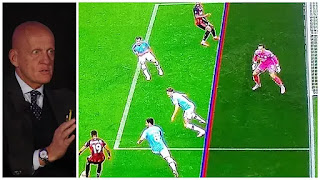FIFA refereeing chief Pierluigi Collina praises VAR for “eliminating clear errors that influence a result” and describes new approaches to offside but warns that it can never completely replace the official’s subjective evaluation. The technology continues to spark controversy, with those in Italy claiming VAR is not used enough and in England’s Premier League arguing it is used too much. In Serie A, the recent row was over defining active and passive offside positions, with goals disallowed for Atalanta and Milan in their games against Roma and Napoli.
“The point of VAR was not to eliminate controversy; it was to eliminate clear errors that influence a result and consequently the regular progress of a game. I think that objective has been achieved,” Collina told La Gazzetta dello Sport newspaper. “It is ultimately up to the referee to decide whether an offside position is active or passive. All VAR can do is to alert him to the possible offside. Interpretation is part of the rules, so although situations can be similar, no two plays will ever be identical. We simply must accept there will be different views of a situation. Technology helps, but it can never replace the human element. It’s the same with handball, we suggested it is a penalty when the arm is raised above the shoulder, but we realised that’s not necessarily the case. A referee has to view the situation again and his interpretation is decisive.”
Collina reiterated the recent report that FIFA are experimenting an automatic offside alert to speed up the process of VAR judging an offside position, which could be in place for the 2022 World Cup. A player is offside with any part of the body he can legally score a goal with, including the shoulder, which prompted similar so-called ‘armpit offside’ calls. “There will be 10-12 cameras checking 29 points on the body of a player, 50 times per second, and software analysing the data in real time to calculate the perfect moment the ball is played and the position of the various players,” continued Collina. “It also includes the grids to make the offside position clear. That is sent to the VAR, who can then inform the referee within seconds in case of active offside. It’s certainly going to be much quicker than it is today.” When some suggest it would be better to do away with VAR entirely, Collina – widely considered the greatest referee of all time – is utterly bemused by the idea. “If I could go back in time and officiate again, I’d love to do it with VAR. Many referees missed important opportunities to correct errors that would’ve only taken a few seconds to sort out. Why give up on such an important safety net? It makes no sense. What we should do is try hard to avoid the need for technology. Referees study, train, know the teams and players they are dealing with. All this helps them to make fewer mistakes, but as nobody is infallible, we can call on VAR if needed. But that happens afterwards, not before.”
Source: Football Italia

